| Listing 1 - 10 of 15 | << page >> |
Sort by
|
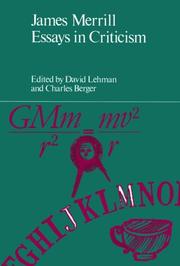
ISBN: 0801414040 Year: 1983 Publisher: Ithaca, N.Y.
Abstract | Keywords | Export | Availability | Bookmark
 Loading...
Loading...Choose an application
- Reference Manager
- EndNote
- RefWorks (Direct export to RefWorks)
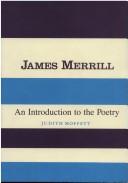
ISBN: 0231052103 Year: 1984 Volume: vol *6 Publisher: New York Columbia University Press
Abstract | Keywords | Export | Availability | Bookmark
 Loading...
Loading...Choose an application
- Reference Manager
- EndNote
- RefWorks (Direct export to RefWorks)
Book
ISBN: 1587297647 9781587297649 9781587296963 1587296969 Year: 2008 Publisher: Iowa City University of Iowa Press
Abstract | Keywords | Export | Availability | Bookmark
 Loading...
Loading...Choose an application
- Reference Manager
- EndNote
- RefWorks (Direct export to RefWorks)
In this meticulously researched, carefully argued work, Evans Lansing Smith argues that the nekyia, the circular Homeric narrative describing the descent into the underworld and reemergence in the same or similar place, confers shape and significance upon the entirety of James Merrill's poetry. Smith illustrates how pervasive this myth is in Merrill's work, not just in The Changing Light at Sandover, where it naturally serves as the central premise of the entire trilogy, but in all of the poet's books, before and after that central text.
Merrill, James Ingram --- Criticism and interpretation. --- Merrill, James, --- Merrill, Jim, --- Merrill, Jimmy, --- Criticism and interpretation
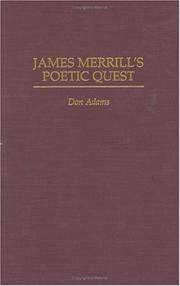
ISBN: 0313302502 Year: 1997 Volume: 81 Publisher: Westport, Conn. ; London Greenwood Press
Abstract | Keywords | Export | Availability | Bookmark
 Loading...
Loading...Choose an application
- Reference Manager
- EndNote
- RefWorks (Direct export to RefWorks)
Merrill, James --- Quests (Expeditions) in literature --- Quests in literature --- Quêtes (Expéditions) dans la littérature --- Quêtes (littérature) --- Quêtes dans la littérature --- Voyage initiatique (littérature) --- Zoektochten (Expeditie) in de literatuur --- Zoektochten in de literatuur --- Merrill, James Ingram --- Criticism and interpretation --- Merrill, James Ingram - Criticism and interpretation. --- Quests (Expeditions) in literature.
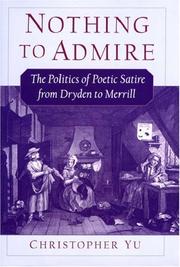
ISBN: 0195155300 1423762932 0198035349 1280502320 1602569762 9781423762935 9781602569768 9781280502323 019772552X 0190288655 9780190288655 9780197725528 9780198035343 Year: 2003 Publisher: New York Oxford University Press
Abstract | Keywords | Export | Availability | Bookmark
 Loading...
Loading...Choose an application
- Reference Manager
- EndNote
- RefWorks (Direct export to RefWorks)
This work argues for the persistence of a central tradition of poetic satire in English that extends from Restoration England to present-day America. The tradition is seen as rooted in the uses of Augustan metaphor to criticize the abuse of social and political power and to promote freedom of mind.
Merrill, James Ingram --- Criticism and interpretation --- Verse satire [American ] --- History and criticism --- Verse satire [English ] --- Political poetry [American ] --- Political poetry [English ] --- Verse satire, American --- Political poetry, American --- Politics and literature --- Political poetry, English --- Verse satire, English --- American verse satire --- American poetry --- Literature --- Literature and politics --- History and criticism. --- Political aspects --- Merrill, James, --- Merrill, Jim, --- Merrill, Jimmy, --- Criticism and interpretation.
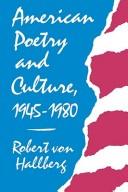
ISBN: 0674030117 0674030125 Year: 1985 Publisher: Cambridge, Mass. Harvard University Press
Abstract | Keywords | Export | Availability | Bookmark
 Loading...
Loading...Choose an application
- Reference Manager
- EndNote
- RefWorks (Direct export to RefWorks)
Poetry --- American literature --- anno 1900-1999 --- American poetry --- Literature and society --- Poésie américaine --- Littérature et société --- History and criticism --- Histoire et critique --- Creeley, Robert, --- Merrill, James Ingram --- Lowell, Robert, jr --- Dorn, Edward --- Criticism and interpretation --- Critique et interprétation --- 820 <73>-1 --- Amerikaanse literatuur: poezie --- 820 <73>-1 Amerikaanse literatuur: poezie --- Poésie américaine --- Littérature et société --- Critique et interprétation --- Lowell, Robert, --- Merrill, James, --- Merrill, Jim, --- Merrill, Jimmy, --- Dorn, Ed --- Criticism and interpretation. --- 20th century --- United States --- Creeley, Robert White --- Lowell, Robert Traill Spence, Jr. --- LITTERATURE ET SOCIETE --- CREELEY (ROBERT), 1926 --- -MERRILL (JAMES INGRAM), 1926 --- -LOWELL (ROBERT), 1917-1977 --- DORN (EDWARD), 1929 --- -20e siècle --- ETATS-UNIS
Book
ISBN: 9780231149303 9780231520294 0231149301 0231520298 9786613629012 1280599189 Year: 2010 Publisher: New York Columbia University Press
Abstract | Keywords | Export | Availability | Bookmark
 Loading...
Loading...Choose an application
- Reference Manager
- EndNote
- RefWorks (Direct export to RefWorks)
Focusing on the poems of Wallace Stevens, Robert Frost, Elizabeth Bishop, and James Merrill, Siobhan Phillips positions everyday time as a vital category in modernist aesthetics, American literature, and poetic theory. She eloquently reveals how, through particular but related means, each of these poets converts the necessity of quotidian experience into an aesthetic and experiential opportunity. In Stevens, Phillips analyzes the implications of cyclic dualism. In Frost, she explains the theoretical depth of a habitual "middle way." In Bishop's work, she identifies the attempt to turn recurrent mornings into a "ceremony" rather than a sentence, and in Merrill, she shows how cosmic theories rely on daily habits. Phillips ultimately demonstrates that a poetics of everyday time contributes not only to a richer understanding of these four writers but also to descriptions of their era, estimations of their genre, and ongoing reconfigurations of the issues that literature reflects and illuminates.
Poetry --- American literature --- anno 1900-1999 --- Herhaling (Retoriek) --- Herhaling in de literatuur --- Repetition (Rhetoric) --- Repetition in literature --- Répétition (Rhétorique) --- Répétition dans la littérature --- American poetry --- Repetition in literature. --- History and criticism. --- Frost, Robert, --- Stevens, Wallace, --- Bishop, Elizabeth, --- Merrill, James, --- Technique. --- 20th century --- History and criticism --- Frost, Robert Lee --- Technique --- Stevens, Wallace --- Bishop, Elizabeth --- Merrill, James Ingram --- Rhetoric --- Literary style --- Merrill, Jim, --- Merrill, Jimmy, --- בישופ, אליזבט, --- Frost, Robert Lee, --- פראסט, ראבערט, --- פרוסט, רוברט, --- فروست ، روبرت --- Фрост, Роберт,
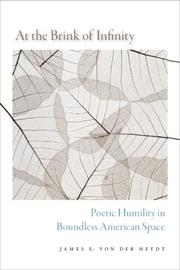
ISBN: 1587297736 9781587297731 9781587296284 1587296284 Year: 2008 Publisher: Iowa City University of Iowa Press
Abstract | Keywords | Export | Availability | Bookmark
 Loading...
Loading...Choose an application
- Reference Manager
- EndNote
- RefWorks (Direct export to RefWorks)
In this carefully crafted analysis, James von der Heydt shines a new light on the lyric craft of Emily Dickinson, Robert Frost, Elizabeth Bishop, and James Merrill and considers how their seascape-vision redefines poetry's purpose.
American poetry --- Vision in literature. --- Space and time in literature. --- Infinite in literature. --- Space and time as a theme in literature --- History and criticism. --- Merrill, James Ingram --- Bishop, Elizabeth, --- Frost, Robert, --- Dickinson, Emily, --- בישופ, אליזבט, --- Frost, Robert Lee, --- פראסט, ראבערט, --- פרוסט, רוברט, --- فروست ، روبرت --- Фрост, Роберт, --- Dickinson, Emily --- Dickinson, Emilia, --- Dickinson, Emily Elizabeth, --- Dikinson, Ėmili, --- D̲ikinson, Emily, --- Ti-chin-sen, Ai-mi-li, --- דיקינסון, אמילי, --- Dykinsan, Ėmili, --- Criticism and interpretation. --- Merrill, James, --- Merrill, Jim, --- Merrill, Jimmy,
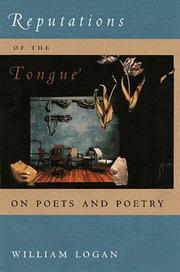
ISBN: 0813016975 Year: 1999 Publisher: Gainesville [etc.] University Press of Florida
Abstract | Keywords | Export | Availability | Bookmark
 Loading...
Loading...Choose an application
- Reference Manager
- EndNote
- RefWorks (Direct export to RefWorks)
Poetry --- English literature --- anno 1900-1999 --- American poetry --- 20th century --- History and criticism --- English poetry --- Ashbery, John Lawrence --- Criticism and interpretation --- Merrill, James Ingram --- Bishop, Elizabeth --- Clampitt, Amy --- Snodgrass, William De Witt --- Hecht, Anthony Evan --- Justice, Donald Rodney --- Hill, Geoffrey --- Auden, Wystan Hugh --- Schnackenberg, Gjertrud
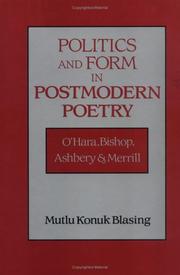
ISBN: 0521496071 0521106133 0511570368 Year: 1996 Publisher: Cambridge : Cambridge University Press,
Abstract | Keywords | Export | Availability | Bookmark
 Loading...
Loading...Choose an application
- Reference Manager
- EndNote
- RefWorks (Direct export to RefWorks)
Approaching post-World War II poetry from a postmodern critical perspective, this study challenges the prevailing assumption that experimental forms signify political opposition while traditional forms are politically conservative. Such essentialist alignments of forms with extra-formal values, and the oppositional framework of innovation versus conservation that they yield, reflect modernist biases inappropriate for reading postwar poetry. Biasing defines postmodern poetry as a break with modernism's valorization of technique and its implicit collusion with technological progress. She shows that four major postwar poets - Frank O'Hara, Elizabeth Bishop, John Ashbery and James Merrill (two traditional and two experimental) - cannot be read as politically conservative because formally traditional or as culturally oppositional because formally experimental. All of these poets acknowledge that no one form is more natural than another, and no given form grants them a superior position for judging cultural and political arrangements. Their work plays an important cultural role precisely by revealing that meanings and values do not inhere in forms but are always and irreducibly rhetorical.
Arts and Humanities --- Literature --- American poetry --- Politics and literature --- Political poetry, American --- Postmodernism (Literature) --- Literary form --- History and criticism. --- History --- Bishop, Elizabeth, --- Merrill, James, --- O'Hara, Frank, --- Ashbery, John, --- Political and social views. --- O'Hara, Francis Russell, --- בישופ, אליזבט, --- Merrill, Jim, --- Merrill, Jimmy,
| Listing 1 - 10 of 15 | << page >> |
Sort by
|

 Search
Search Feedback
Feedback About UniCat
About UniCat  Help
Help News
News